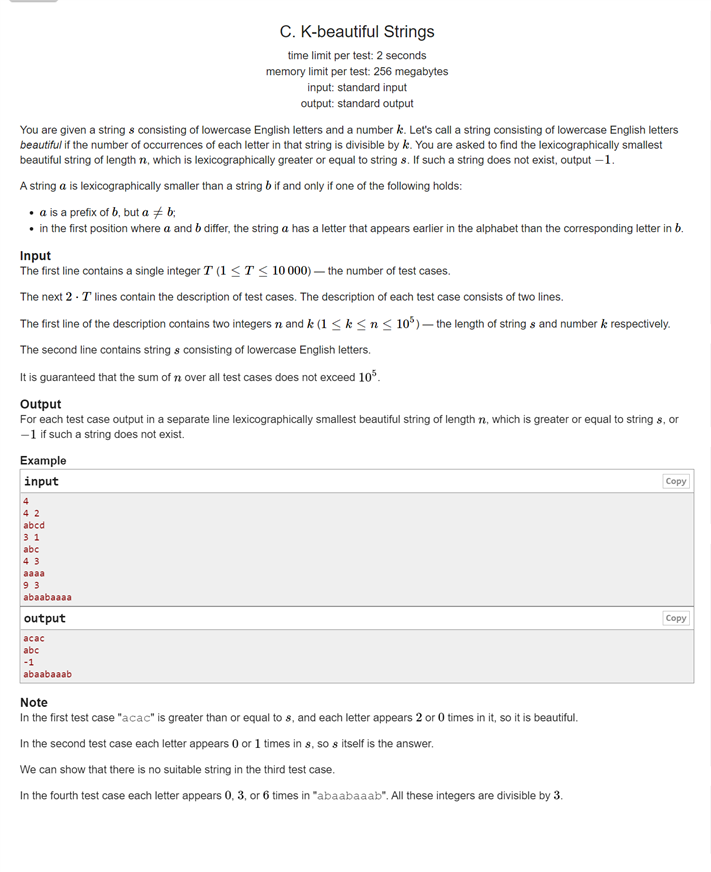https://codeforces.ml/contest/1493/problem/C

本题解主要是对官方题解的翻译,或者说是自己对官方题解的理解。假设原串为s,答案串为t,并且下标从1开始。首先n%k != 0的情况下t必然不存在!主要步骤分为两大步,第一步是找到答案串和原串的最大公共前缀,第二步是对后缀进行字母分配,理由简单描述如下,第一步中找前缀,很显然答案串比原串的字典序大,且长度相等,那么必然存在公共前缀(若不存在,则前缀长度为0),假设前缀长度len(pref),那么tpref > spref ,否则要么s>t要么pref并不是最长公共前缀,之后就是第二步,既然已经有tpref > spref,那么t>s已经恒成立了,所以只需要将剩余的字母安放并排序即可,这样就能保证t最小且beautiful
· 第一步:找到答案串和原串最大公共前缀
原串从后往前遍历,用cnti 维护目前字母表第i+1 个字母的数目,如cnt1为字母b 的数目,用sum维护(k - cnti % k) % k的和,表示目前剩余需要增添使得整除k的总字母数(确实有点绕啊,我当时就搞了半天才理解。。。),当sum <= n - i 时,得到最大公共前缀
· 第二步:为后缀分配字母
遍历cnt分别增添字母所需数量,得到的串长度不足n的用a补齐(之所以补的a最后依旧能被k整除,是因为k|n,而其余字母数目均被k整除,所以显然a可以),最后对后缀排序即可(其中分界点不参与排序)

1 #pragma GCC optimize(2) 2 #include <bits/stdc++.h> 3 using namespace std; 4 #define IOS std::ios_base::sync_with_stdio(false), std::cin.tie(0), std::cout.tie(0); 5 typedef long long ll; 6 typedef unsigned long long ull; 7 const int mod = 1e9 + 7; 8 const int inf = 0x3f3f3f3f; 9 struct InputOutputStream { 10 enum { SIZE = 1000001 }; 11 char ibuf[SIZE], *s, *t, obuf[SIZE], *oh; 12 bool eof; 13 14 InputOutputStream() : s(), t(), oh(obuf), eof(false) {} 15 ~InputOutputStream() { fwrite(obuf, 1, oh - obuf, stdout); } 16 17 explicit operator bool() const { 18 return static_cast<bool>(eof == false); 19 } 20 21 inline char read() { 22 if (s == t) t = (s = ibuf) + fread(ibuf, 1, SIZE, stdin); 23 return s == t ? -1 : *s++; 24 } 25 26 inline InputOutputStream &operator>>(char* x) { 27 static char c; 28 for (c = read(); isspace(c); c = read()) 29 if (c == -1) {eof = true; return *this;} 30 for (; !isspace(c); c = read()) *x = c, ++x; 31 *x = 0; 32 return *this; 33 } 34 35 template <typename T> 36 inline InputOutputStream &operator>>(T &x) { 37 static char c; 38 static bool iosig; 39 for (c = read(), iosig = false; !isdigit(c); c = read()) { 40 if (c == -1) {eof = true; return *this;} 41 iosig |= c == ‘-‘; 42 } 43 for (x = 0; isdigit(c); c = read()) x = x * 10 + (c ^ ‘0‘); 44 if (iosig) x = -x; 45 return *this; 46 } 47 48 inline void print(char c) { 49 if (oh == obuf + SIZE) { 50 fwrite(obuf, 1, SIZE, stdout); 51 oh = obuf; 52 } 53 *oh++ = c; 54 } 55 56 template <typename T> 57 inline void print(T x) { 58 static int buf[23], cnt; 59 if (x != 0) { 60 if (x < 0) print(‘-‘), x = -x; 61 for (cnt = 0; x; x /= 10) buf[++cnt] = x % 10 | 48; 62 while (cnt) print((char)buf[cnt--]); 63 } else print(‘0‘); 64 } 65 66 template <typename T> 67 inline InputOutputStream &operator<<(const T &x) { 68 print(x); 69 return *this; 70 } 71 72 inline void print(const char* x) { 73 for(; *x; x++) 74 print(*x); 75 } 76 77 inline void print(char* x) { 78 for(; *x; x++) 79 print(*x); 80 } 81 } io; 82 83 const int maxn = 1e5 + 50; 84 85 int t, n, k; 86 char s[maxn]; 87 int cnt[26]; 88 int sum = 0; 89 char res[maxn]; 90 91 inline int get_cnt(int x) { 92 return (k - x % k) % k; 93 } 94 95 signed main() { 96 io >> t; 97 while(t--) { 98 sum = 0; 99 memset(cnt, 0, sizeof(cnt)); 100 memset(res, 0, sizeof(res)); 101 io >> n >> k; 102 io >> (s + 1); 103 for(int i = 1;i <= n;++i) { cnt[s[i]-‘a‘]++; } 104 for(int i = 0;i < 26;++i) { 105 sum += get_cnt(cnt[i]); 106 } 107 if(sum == 0) { 108 io << (s + 1) << ‘\n‘; 109 continue; 110 } 111 if(n % k != 0) { 112 io << "-1\n"; 113 continue; 114 } 115 for(int i = n;i >= 1;--i) { 116 bool flag = false; 117 sum -= get_cnt(cnt[s[i]-‘a‘]); 118 cnt[s[i]-‘a‘]--; 119 sum += get_cnt(cnt[s[i]-‘a‘]); 120 for(int j = s[i] - ‘a‘ + 1;j < 26;++j) { 121 int lst_sum = sum; 122 sum -= get_cnt(cnt[j]); 123 cnt[j]++; 124 sum += get_cnt(cnt[j]); 125 126 if(sum <= n - i) { 127 for(int p = 1;p <= i - 1;++p) { 128 res[p] = s[p]; 129 } 130 res[i] = ‘a‘ + j; 131 int tot = i; 132 for(int w = 0;w < 26;++w) { 133 int f = get_cnt(cnt[w]); 134 while(f--) { res[++tot] = w + ‘a‘; } 135 } 136 while(tot < n) { res[++tot] = ‘a‘; } 137 sort(res + 1 + i, res + 1 + n); 138 io << (res + 1) << ‘\n‘; 139 flag = true; 140 break; 141 } 142 143 sum = lst_sum; 144 cnt[j]--; 145 } 146 if(flag) { break; } 147 } 148 } 149 return 0; 150 }
Codeforces Round #705 (Div. 2) C
原文:https://www.cnblogs.com/mfsyflt/p/14508024.html